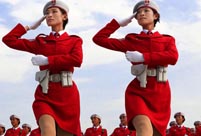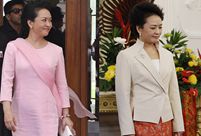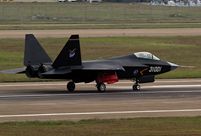 Bikini show in 2014 China Final of Miss Tourism World
Bikini show in 2014 China Final of Miss Tourism World
 Close-up view of August Aerobatic Team
Close-up view of August Aerobatic Team
 Goddesses married in 2014
Goddesses married in 2014
 Polar region photos raise worldwide awareness of global warming
Polar region photos raise worldwide awareness of global warming
 Get off at the last stop — Beijing Subway in vision
Get off at the last stop — Beijing Subway in vision
 Top 100 beauties in the world!
Top 100 beauties in the world!
 Gallery: Who is the most beautiful one?
Gallery: Who is the most beautiful one?
 If you like autumn, put your hands in the air!
If you like autumn, put your hands in the air!
 Fan Bingbing's "Queen style" in new play
Fan Bingbing's "Queen style" in new play
 Lingerie show at 2014 Miss China
Lingerie show at 2014 Miss China
BUSAN, South Korea, Dec. 12 -- South Korea and the Association of Southeast Asian Nations (ASEAN) on Friday agreed to continue efforts to denuclearize the Korean Peninsula, urging the Democratic People's Republic of Korea (DPRK) to completely implement international obligations.
The agreement came after South Korean President Park Geun-hye and leaders of the 10 ASEAN countries held a special summit in Busan, a port city in southeast South Korea, for two days through Friday.
A joint statement was announced, saying that it would be important to maintain a sustainable peace and stability on the Korean Peninsula and Northeast Asia. To attain the goal, South Korea and ASEAN will continue efforts for the peninsula's denuclearization.
The statement urged Pyongyang to make a complete implementation of all UN Security Council's resolutions and international obligations and promises made under the Sept. 19 Joint Statement, which was adopted in 2005 to dismantle the DPRK's nuclear weapons program.
It stressed the need for resuming the long-stalled six-party talks that will become the base of complete, verifiable and irreversible denuclearization on the peninsula.
The six-party talks, which involve, China, the DPRK, the United States, South Korea, Russia and Japan, was initiated in Beijing in August 2003 but has been halted since December 2008.
"Korea and the ASEAN shared views that security in Northeast Asia and Southeast Asia is closely linked," Park said in a joint press conference with Myanmar President Thein Sein after the summit meeting. "(The two sides) agreed to strengthen cooperation in security to create sustainable peace and stability in both regions," said Park.
Tensions remained on the peninsula as the two Koreas exchanged quarrels. Seoul voiced serious regrets on Friday over the DPRK's condemnation of President Park by name. The DPRK's Committee for the Peaceful Reunification of Korea (CPRK) on Thursday censured Park by name, warning that she should "control her tongue."
Park has said in a recent keynote speech in Seoul that the " North's nuclear development is the biggest factor of instability in Northeast Asia and poses a serious threat to world peace."
Meanwhile, South Korea and the ASEAN agreed to raise trade between the two sides to 200 billion U.S. dollars by 2020 through the maximum use of free trade agreement (FTA) already signed eight years ago.
The two sides will maximize the usage of the bilateral FTA, aiming to lift the trade value between the two sides to 200 billion U.S. dollars in 2020 from 135 billion U.S. dollars in 2013.
The ASEAN-South Korea FTA negotiations reached a conclusion in 2006, which more than doubled the bilateral trade from 61 billion U.S. dollars in 2006 to 135 billion U.S. dollars in 2013.
The two sides will deepen cooperation in energy and infrastructure projects, while seeking new cooperation areas going forward.
South Korea will share its experience of fast-growing economy with the Asian countries, and help them eradicate poverty in rural areas through the so-called "Saemaul Movement," which was adopted by the late strongman Park Chung-hee, father of the incumbent president Park Geun-hye, in the 1970s.
The ASEAN, including Brunei, Cambodia, Indonesia, Laos, Malaysia, Myanmar, the Philippines, Thailand, Singapore and Vietnam, emerged as a key trade partner of South Korea.
The ASEAN is the No.2 trade partner of South Korea, following China, and the third-largest investment destination of South Korean companies.
On Wednesday, Park announced an effective conclusion of the FTA negotiations with Vietnamese Prime Minister Nguyen Tan Dung after holding a bilateral summit meeting at a hotel in Busan.
The FTA negotiations, launched in August 2012, came to a conclusion in 28 months, becoming the fifth FTA deal reached under the Park Geun-hye administration.
Vietnam agreed to liberalize 92.2 percent of all goods imported from South Korea in terms of import value. South Korea's liberalization rate was 94.7 percent.
 20 years on: Relocated Three Gorges residents through lens
20 years on: Relocated Three Gorges residents through lens PLA HK Garrison veterans leave behind beautiful smiles
PLA HK Garrison veterans leave behind beautiful smiles Representative beauties of each province in China
Representative beauties of each province in China Chestnut girl goes viral online
Chestnut girl goes viral online Victoria's Secret Fashion Show
Victoria's Secret Fashion Show In photos: Bright and brave female soldier of PLA
In photos: Bright and brave female soldier of PLA China's charming first lady
China's charming first lady Excellent photos of Zhuhai Air Show
Excellent photos of Zhuhai Air Show China's heavyweight aircraft
China's heavyweight aircraft Society needs consensus on street politics
Society needs consensus on street politics Policy bank plan gets mixed reaction
Policy bank plan gets mixed reaction  Shopaholics
Shopaholics  Hungry moments
Hungry momentsDay|Week|Month